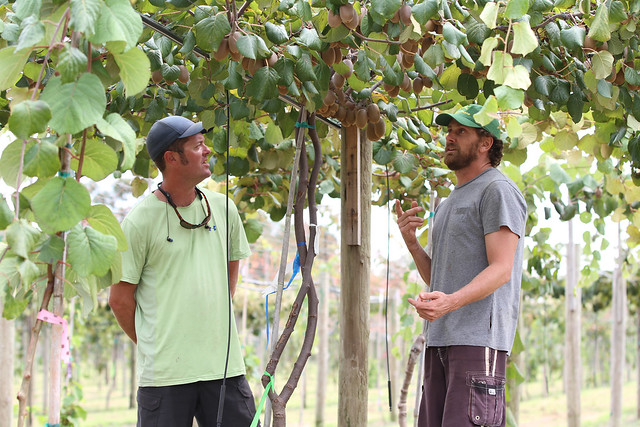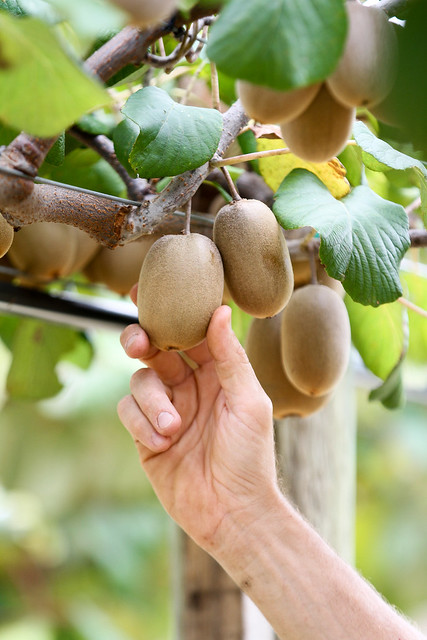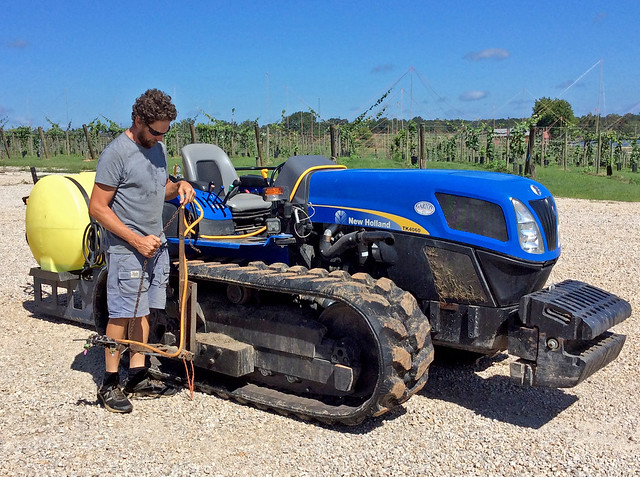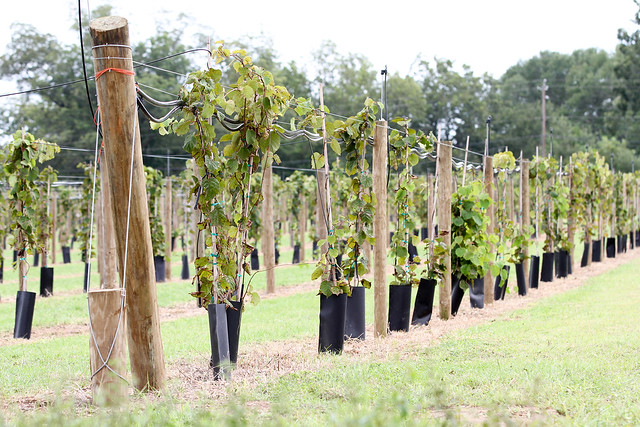Auburn horticulture alum gets kiwifruit orchard off the ground in Reeltown
Article body
Outside of a couple of Class 2A high school football championships over the years, Reeltown, Alabama, never had much of a claim to fame. But a risky agribusiness venture that put down roots there in 2014 has given the community of 750 or so a reason to brag. Today, Reeltown is home to the only commercial golden kiwifruit orchard in the nation.
It is the Southeast Kiwi Farming Cooperative, located 20 miles or so from Auburn University's Ag Hill. While the farm is a quick trip for the students and faculty who benefit from the learning opportunities the kiwifruit orchard offers, two-time Auburn horticulture alum and co-op vice president and manager Clint Wall had to go halfway around the world and back to get there.
Growing up in Mobile, Wall never envisioned himself as a farmer. But when the journalism program he was enrolled in at a university in the Port City was discontinued, he found himself wondering what to do next. That's when his high school sweetheart, Jenny—who is now his wife—encouraged him to spend a summer on her relatives' farm in Hawaii.
It was the experience of a lifetime and the beginning of a journey that would take the Walls halfway around the world and back again.
"I got bitten by the farming bug," Wall says, and when he returned to Alabama, he enrolled in the College of Agriculture's undergraduate horticulture program, specializing in fruit and vegetable production. It was fall 2000.
THE HEAD OF HIS CLASS
During one of his first horticulture classes, Wall met the man he now affectionately refers to as "Doc"—Billy Dozier, longtime horticulture professor, now professor emeritus. At the time, Dozier was working to develop several varieties of kiwifruit. Dozier, ever in need of quality grad students to assist in this work, now admits he often singled out hard-working, high-performing undergrads and tried to convince them to stay at Auburn and pursue graduate degrees.
"After about the second test I gave Clint, I said, ‘I've got to get this one into grad school,'" Dozier says. "He was by far the best student I had."
Sensing Wall's potential, Dozier put the undergrad to work with the kiwifruit project. In addition to teaching the self-described "city kid" how to farm, the professor persuaded Wall to stay at Auburn for a master's degree. Wall, an avid kayaker, was swayed by the possibility to travel to New Zealand, the world's third largest kiwifruit-producing country and home to some of the world's most beautiful kayaking destinations.
Unfortunately, the New Zealand trip didn't pan out during his graduate work. But connections he made during that time paid off, and shortly after he graduated with his master's in applied horticulture and horticultural business management in 2006, he, wife Jenny and their first baby headed to New Zealand, where Wall had accepted a short-term position with the country's largest private kiwifruit orchard.
A METEORIC RISE
What was supposed to be a one-year stint turned into an eight-year stay on the island, where two more children were born to the couple while Wall climbed the corporate ranks within New Zealand's kiwifruit industry.
"Honestly, I was very lucky," Wall said, adding that, although nothing could have prepared him for the roles he would play in New Zealand, he left Auburn with a solid technical background and a "dirty-hand mentality." The combination served him and the industry well as he helped lead New Zealand's largest orchard services and pack house, Seeka, through the 2011 outbreak of Pseudomonas syringae pv. actinidiae, or Psa, a devastating bacterial canker of kiwifruit.
Meanwhile, back at Auburn, Dozier continued to plug away at his dream of turning the kiwifruit varieties he had patented into viable niche crops for Southeastern growers. He conducted most of his kiwifruit trials at the Alabama Agricultural Experiment Station's Chilton Research and Extension Center near Clanton.
Kiwifruit wasn't Dozier's sole research project at the Chilton station. He also had a number of chestnut trees growing as part of his efforts to develop new, wildlife-attracting cultivars.
THE START OF SOMETHING BIG
The chestnuts were of particular interest to Wayne Bassett.
Bassett and his brother, Jimmy, own Becks Turf Farm near Tuskegee and The Wild Group, a nursery specializing in fruit and nut trees, such as the chestnut, that appeal to wildlife and are excellent choices to plant on hunting lands. One sunny day in September 2011, Bassett met Dozier at the center to check out the chestnuts.
While there, though, he took Dozier up on an offer to sample the fuzzy kiwifruit that were being harvested at the time.
"I got weak in the knees," Bassett says of his first encounter with the Auburn-developed fruit.
That one taste was all it took. Next thing you know, the Bassett brothers and Dozier had established Gold Kiwi Group LLC and bought the exclusive right to propagate, grow and sell five patented cultivars Dozier and others developed at Auburn, including the yellow-fleshed AU Golden Dragon and AU Golden Sunshine and the traditional, green-fleshed AU Fitzgerald, all of which are female varieties, and the male pollinators AU Golden Tiger and AU Arthur.
WANTED: LAND AND MONEY
The partners were certain that kiwifruit not only would prove popular with homeowners but would provide a new specialty crop for Southeastern growers, too, and they decided they needed to demonstrate that. But before that could happen, they had three major needs: land suitable for growing the vines, a farm manager with kiwifruit experience and investors who believed in their dream and the potential for major profit.
Their first need was met when, in 2014, they found a sprawling property right under their noses in Macon County. Its owner was none other than former Auburn football coach Pat Dye, who was looking to sell. Dye had been growing hay and pines on the land and managing its white-tailed deer population for hunting. The Bassetts and Dozier bought 418 acres of Dye's land, which included several ponds and a barn—a veritable kiwi-farming starter kit.
As for finding an experienced manager, the stars aligned for the group again because, at about the same time, Wall's wife, Jenny, who is one of eight children, convinced her husband of the need to move from New Zealand back closer to family. The problem was that the vast majority of the U.S. kiwifruit industry was located in Southern California. All of it, of course, except for one fledgling operation 30 minutes from Auburn. When Gold Kiwi Group offered Dozier's former star student the role of manager, he gladly accepted.
The third requirement—financial backing—was arguably the most vital. But Wall, taking advantage of the network of professional contacts he had built in his years in New Zealand's kiwi industry, seized the chance to pitch the investment opportunity to a representative of Sun Pacific, the largest producer of kiwifruit in the States. The corporation was game, and the stage was set for Dozier to realize his dream of kiwifruit production in Alabama.
Since 2014, Wall, Dozier and the Bassetts have worked tirelessly to build the infrastructure necessary for kiwifruit production and to get vines in the ground. Wall now has 172 of the 418 acres planted in 37,000 vines—all grafted, mind you—growing on a web of six-and-a-half-foot-tall trellis-like "pergolas." He also has two pumping stations that have a total of seven engines, five diesel and two electric, to supply the water needed, not only for irrigation, but also to coat every plant with a thin layer of ice to protect them in the event of frost.
NOT WITHOUT HURDLES
While the scene today is awe-inspiring, no part of the building process was easy.
"In New Zealand, I could go to any supplier and pick up exactly what I needed," Wall said. "That, obviously, was not the case here because nobody's ever done this before."
Wall now heaps praise on local equipment dealers, who searched the world on his behalf to find the machines and materials he needed for the orchard undertaking, and the folks at Great Southern Wood Preserving in Abbeville, makers of YellaWood pressure-treated pine, who helped develop the perfect product to use as support posts for the farm's massive pergola infrastructure.
And he can't say enough about his all-star team of employees, which includes two fellow Auburn horticulture alums, Jon Malone and Eric Houser.
Kiwifruit vines don't yield fruit until the third or fourth year of production, so this fall marked the farm's first harvest from a few vines that were planted the first year. In 2019, Wall expects Sun Pacific to evaluate the Southeast Kiwi Farming Cooperative's performance, and he feels positive about where the venture stands and what it will have to show for all the hard work.
THE MARKETING PLAN
If they are deemed successful, however, don't expect to see Alabama-grown kiwifruit on the produce aisles of your local supermarket, because Wall and team don't intend to market the fruit domestically. Wall says that countries in the Southern Hemisphere, primarily New Zealand, meet global kiwifruit demand six months of the year but that even growers in New Zealand's highly coordinated system have a hard time meeting demand for the fruit, especially in highly profitable Asian markets, the rest of the year.
"If we can get our fruit into that window, when supply is down, we can take advantage of that supply-demand imbalance," Wall said. "That's our business plan."
It's a good enough plan to inspire the confidence of California investors as well as Wall's two biggest fans in Alabama—Dozier and Bassett. In fact, the two say if there's anyone on the planet who has what it takes to see the plan through to completion, it's Wall.
While Bassett notes that Wall is one of the most experienced kiwifruit growers in the U.S., Dozier adds that Wall's character has as much to do with what their team has accomplished thus far as anything.
"Clint's just an honest, hard-working, good person," he says. "He's taken the dream that we had and made it a reality, which was a very hard thing to do. He's just an outstanding young man."
Related Media
Media interested in this story can contact Communications Director Preston Sparks at (334) 844-9999 or preston.sparks@auburn.edu.
Auburn University is a nationally ranked land grant institution recognized for its commitment to world-class scholarship, interdisciplinary research with an elite, top-tier Carnegie R1 classification, life-changing outreach with Carnegie’s Community Engagement designation and an undergraduate education experience second to none. Auburn is home to more than 30,000 students, and its faculty and research partners collaborate to develop and deliver meaningful scholarship, science and technology-based advancements that meet pressing regional, national and global needs. Auburn’s commitment to active student engagement, professional success and public/private partnership drives a growing reputation for outreach and extension that delivers broad economic, health and societal impact.








